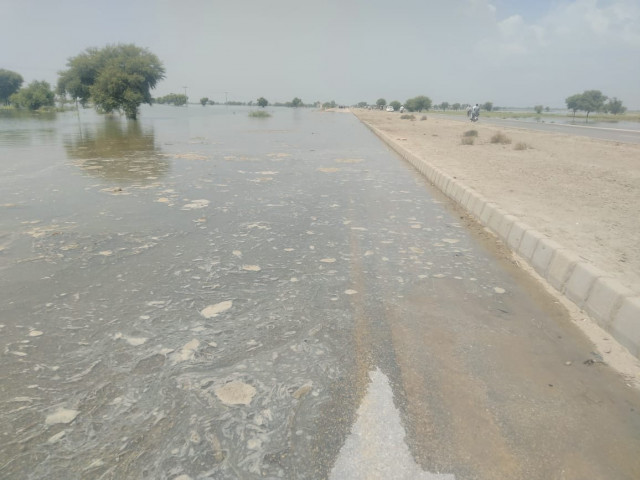Flooding triggers fresh migrations from southern Pakistan
Thousands leave Dadu district in southern Sindh province as floodwaters surround Dadu city

Thousands of panicked citizens have left a densely-populated district in southern Pakistan, following a fresh spell of floods, adding to the growing number of displaced people, officials and local media reported on Sunday.
The Dadu district of southern Sindh province has been surrounded by floodwaters, leaving only one passage for the residents to leave the city as the water level in Manchar Lake, the country's largest freshwater body, is continuously rising.
Gushing floodwaters have washed away the first defense line of the city – home to over 1 million people – forcing the administration backed by the army troops to strengthen the remaining embankments, local broadcaster Geo News reported.
Footage aired on local TV channels showed thousands of stranded people lodged in tents or under open skies along the main highway that leads to Hyderabad, the second largest district of Sindh after Karachi.
Either side of the highway could be seen inundated in floodwaters for miles.
Another footage showed hundreds of flapped citizens, on mini trucks, wagons, and auto rickshaws, leaving the city. Many others along with their livestock were also spotted trudging along the road under the baking sun.
The huge flooding also forced the administration to shift nearly 400 prisoners from Dadu district jail to the Hyderabad prison.
Sindh Chief Minister Murad Ali Shah told reporters on Sunday that the rescue agencies are trying their best to save the city.
The recent downpours – 500% higher than average – and massive floods have left 125 million people homeless in Sindh alone, aside from causing a colossal loss of Rs350 billion ($1.5 billion) to agriculture and another Rs50 billion ($221 million) to the livestock.
The severity of the situation also prompted the country's powerful Army Chief Gen. Qamar Javed Bajwa to air dash to the literally besieged Dadu city on Saturday evening, directing the troops to accelerate the relief and rescue operations.
Meteorologists heap the blame on climate change, and global warming, which have increased the ferocity, and frequency of the monsoon rains amid fast-melting glaciers.
The current monsoon season that struck the South Asian nuclear country in June, has inundated one-third of Pakistan apart from killing over 1,400 people, according to the country's National Disaster Management Authority.
Over 33 million people of the country's 220 million population have been displaced by the latest downpours and flooding in all four provinces since mid-June, in addition to causing a staggering $30 billion in damages to the already weakened infrastructures.



















COMMENTS
Comments are moderated and generally will be posted if they are on-topic and not abusive.
For more information, please see our Comments FAQ